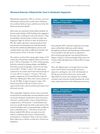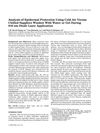
Search
for
Sort by
Research
270-300 / 1000+ results

research Acne Vulgaris
Acne vulgaris is a common skin condition that can cause low self-esteem and depression, and early treatment is important to prevent scarring.

research General Dermatology: Comprehensive Overview of Dermatological Conditions
The document explains various skin conditions and their treatments.

research The Role of Heat Shock Proteins in the Pathogenesis of Polycystic Ovarian Syndrome: A Review of the Literature
Heat Shock Proteins are important in the development of Polycystic Ovarian Syndrome and could be targets for new treatments.

research Managing Dermatologic Effects of Gender-Affirming Therapy in Transgender Adolescents
Gender-affirming therapy can cause skin issues like acne and hair loss in transgender adolescents, and more research is needed on its dermatological effects.

research Exosomal MicroRNA-Based Therapies for Skin Diseases
miRNA-based therapies show promise for treating skin diseases, including hair loss, in animals.

research Bacteria Induce Skin Regeneration
Certain bacteria can enhance skin regeneration.

research Long-Term Removal of Unwanted Hair Using Light
Laser and light treatments can effectively remove hair long-term.

research Ultrasound Detection of Retained Hair Tracts in Hidradenitis Suppurativa
Ultrasound shows 80% of Hidradenitis Suppurativa patients have abnormal hair tracts that may worsen the condition.

research State-Dependent Signaling by Cav1.2 Regulates Hair Follicle Stem Cell Function
Cav1.2 affects hair growth and could be a target for hair loss treatments.

research Pseudofolliculitis Barbae: Overview and Treatment Modalities
The document concludes that various treatments, including laser therapy, are effective for managing pseudofolliculitis barbae, especially in darker skin types.

research Analysis of Epidermal Protection Using Cold Air Versus Chilled Sapphire Window with Water or Gel During 810 nm Diode Laser Application
Cold air and a chilled sapphire window both protect the skin during laser treatments, and work better with water or gel, especially for darker skin.

research Topical Minoxidil in Androgenetic Alopecia: Scandinavian and Middle East Experience
The study found that using 2% minoxidil solution can help grow hair and is safe.

research Does Insulin Resistance Increase Thyroid Volume in Patients with Polycystic Ovary Syndrome?
Insulin resistance is linked to larger thyroid volume in patients with polycystic ovary syndrome.

research Androgenetic Alopecia in the Female
2% topical minoxidil effectively treats female hair loss with minimal side effects.

research Medical Treatment of Hirsutism
The conclusion is that the best initial treatment for hirsutism is usually oral contraceptives, with the addition of antiandrogens or insulin sensitizers if needed, and topical eflornithine or laser treatments as supplementary options.

research External Light Activates Hair Follicle Stem Cells Through Eyes Via an ipRGC–SCN–Sympathetic Neural Pathway
Light can turn on hair growth cells through a nerve path starting in the eyes.

research Low-Level Laser Therapy and Hair Regrowth: An Evidence-Based Review
Low-level laser therapy is safe and can increase hair growth for male and female pattern hair loss.

research Pathogenesis of Cardiovascular Alterations in Dogs Treated with Minoxidil
Using minoxidil on dogs can cause serious cardiovascular damage, including arterial injury and hemorrhagic lesions.

research Use of Topical Minoxidil Therapy for Androgenetic Alopecia in Women
Minoxidil helps hair growth and reduces shedding in women.

research Long-Term Treatment of Severe Hypertension with Minoxidil, Propranolol, and Furosemide
Minoxidil, propranolol, and furosemide effectively control severe hypertension, but may cause sodium retention.

research Topical Minoxidil (3%) in Extensive Alopecia Areata, Including Long-Term Efficacy
3% topical minoxidil effectively treats extensive alopecia areata with few side effects.

research Inhibition of 5α-Reductase, IL-6 Secretion, and Oxidation Process of Equisetum Debile Extract as Functional Food and Nutraceutical Ingredients
Equisetum debile extract, especially the ethyl acetate type, may be a promising natural ingredient for anti-hair loss products.

research An Approach to the Patient with Hirsutism
The document concludes with guidance for doctors on diagnosing and treating hirsutism effectively and safely.

research Novel TMEM173 Mutation and the Role of Disease-Modifying Alleles
A new mutation in the STING protein causes a range of symptoms and its severity may be affected by other genetic variations; treatment with a specific inhibitor showed improvement in one patient.

research Treatment of Female Androgenetic Alopecia with Minoxidil 2%
Minoxidil 2% effectively treats female hair loss, promoting growth and density.

research Hirsutism: Diagnosis and Management
The conclusion is that hirsutism should be diagnosed and treated because it affects quality of life and may signal other health problems.

research Long-Term Efficacy of Topical Minoxidil in Male Pattern Baldness
Topical minoxidil effectively treats male pattern baldness and prevents hair loss.

research Update on the Dermatologic Use of Systemic Glucocorticosteroids
Systemic glucocorticosteroids are a primary treatment for various skin conditions but require careful management due to potential side effects and relapses.

research Increased Levels of Prostaglandin-Like Material in Canine Blood During Arterial Hypotension Produced by Hydralazine, Dihydralazine, and Minoxidil
These drugs raise prostaglandin-like material in dog blood, possibly causing blood vessel widening.